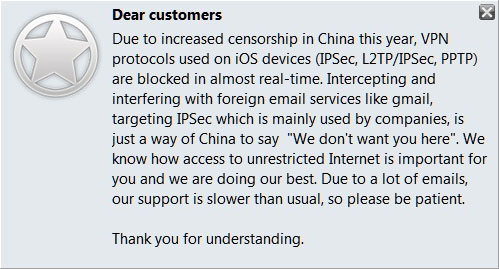A recent upgrade to China’s Internet censorship apparatus has VPN users in China scrambling to find new ways around the country’s Great Firewall.

Wednesday morning Astrill, a VPN service popular among expats in China, sent out a message that seemed ripe with the frustration many of its customers were surely also feeling. The notice explained that increased censorship in China has caused iOS VPN protocols (IPSec, L2TP/IPSec and PPTP) to be blocked in near real-time.

Astrill is not alone. StrongVPN is also reporting connection issues from China, and TunnelBear told TechCrunch that it is investigating connection problems from China-based customers as well.
In a statement relayed by TechCrunch, president of Golden Frog (the company behind VyperVPN), Sunday Yokubaitis said:
“The Chinese government has attempted to curtail the use of VPNs that its citizens use to escape the Great Firewall for a couple years. [The] latest attack appears to use deep packet inspection to inspect and block VPN protocols in combination with blocking specific VPN server endpoints”
While VyperVPN claims its service remains unaffected, a spokesperson from the company told TechCrunch that these blocks are “more sophisticated than what we’ve seen in the past.”
Beijing-based state mouthpiece Global Times ran a story on the upgrades and blocks yesterday with an unsurprisingly sympathetic tone towards the increase in censorship.
Cyber security analysts on Thursday defended China’s Internet management after an overseas VPN (virtual private network) company on Wednesday announced some of its users in China have been unable to use the service since an upgrade of the Great Firewall, China’s Internet infrastructure.
Cyber services should observe the network governance of the country for safety, analysts urged.
…
Whether to block VPN services and how to block them are closely related to the country’s ability of network governance, Qin An, a cyber security expert at the China Institute for Innovation and Development Strategy, told the Global Times Thursday.
“Authorities apparently cannot ignore those services as they affect our cyberspace sovereignty. For instance, a shortcut has to be blocked since it could be used for some ulterior purposes although it might affect others who use it in a right way,” said Qin.
It’s a challenge to draw the clear lines Qin sees between “cyberspace sovereignty” and sharing mindless frivolity on Facebook/Twitter/Instagram. While domestic information control is certainly the primary purpose for the blocks, it’s hard to ignore the undertone towards foreigner visitors, residents, and businesses. As Astrill so clearly put it: “targeting [VPN protocol] IPSec, which is mainly used by companies, is just a way of China to say ‘We don’t want you here’.”








I’m glad mine it’s still working! Here’s how I set it up for $5 a month: http://blog.loadingdata.nl/climbing-the-great-firewall/
SO ANNOYING.
It’s really getting harder and harder to justify living in a country that wants no freedom… On the one hand they seem to love foreigners to get something out of them. On the other hand, China keeps working to reject all positive foreign influence. Which is it?
I’m not one to complain all the time, but it’s getting harder is all.